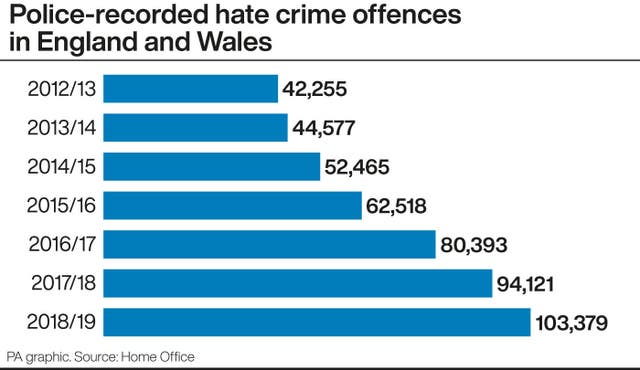Hate crimes hit a record high in the last year with a surge in the number of reported offences triggered by sexual orientation and transgender identity, official figures show.
Police in England and Wales recorded 103,379 hate crimes in 2018/19 – 10% more than the previous year and more than double the 2012/13 figure of 42,255.

Race remained the main trigger in the majority of reported offences at 76% of the total, an 11% rise in the last year from 71,264 to 78,991.
There were jumps in the number of transgender identity hate crimes – up by 37% in the last year from 1,703 to 2,333 – and a 25% hike in offences motivated by sexual orientation (14,491, up from 11,592).
Disability hate crimes rose by 14% from 7,221 to 8,256; and offences triggered by religion rose by 3% from 8,339 to 8,566, the data showed.
The increases are partly because of improvements in the way crimes are recorded, but there were spikes seen after events such as the EU referendum and the terrorist attacks in 2017, as well as a rise in reports in the summer of 2018 and January this year.
Over half (54%) of the hate crimes recorded by the police were for public order offences, a third (36%) involved violence while 5% were recorded as criminal damage and arson.
Around 12% of the offences were estimated to have more than one motivation, with the majority of these being both race and religion.
Hate crimes are defined as those perceived to be motivated by hostility or prejudice of a characteristic.
Five strands are monitored nationally: race or ethnicity; religion or beliefs; sexual orientation; disability; and transgender identity.
But some police forces log other types of hostility under hate crime, including reports of misogyny and incidents where victims were targeted because of their age or membership of an “alternative sub-culture”, such as goths.


















